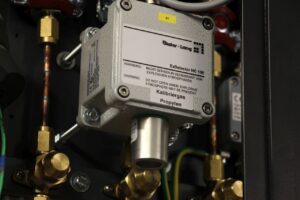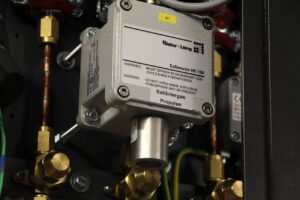Lauda-Königshofen, 5 November 2019
The ongoing development and ever greater acceptance of new drives which use electricity or hydrogen poses new challenges for automobile manufacturers. Suppliers and service providers who support established automobile manufacturers with their know-how are a crucial success factor for dealing with electromobility. Bertrandt AG provides its customers with test stands with climatic chambers to test high-voltage batteries from the module level and hybrid batteries to batteries for all-electric vehicles under various climatic and load conditions. The components are exposed to a wide variety of conditions in climate simulations or accelerated aging in fatigue tests. Bertrandt has successfully offered these industry-specific development services for over 40 years and is a globally operating company with around 13,000 employees and 57 locations. This year the company built one of the largest high-voltage battery test centers in Germany in Ehningen. Bertrand has put its faith in temperature control technology from LAUDA to equip the new test chambers.
 In addition, the company has ordered Process Cooling Units with volume flow control from LAUDA which meet the high demands of customers in the automotive sector. The units are used to control the temperature of test specimens inside a climatic chamber, such as HV storage devices, i.e. high-voltage batteries, which are used in electric cars as well as solar systems. The customer uses two large SUK 400W units for performance tests and ten additional SUK 350W units for endurance tests and simulation runs. The Process Cooling Units precisely control the temperature from -40 to 120 °C.
In addition, the company has ordered Process Cooling Units with volume flow control from LAUDA which meet the high demands of customers in the automotive sector. The units are used to control the temperature of test specimens inside a climatic chamber, such as HV storage devices, i.e. high-voltage batteries, which are used in electric cars as well as solar systems. The customer uses two large SUK 400W units for performance tests and ten additional SUK 350W units for endurance tests and simulation runs. The Process Cooling Units precisely control the temperature from -40 to 120 °C.
The special feature : LAUDA develops the refrigeration systems with a water/glycol mixture as the temperature control medium and a single-stage schema cooling circuit. By dispensing with a cascade refrigeration system, LAUDA can guarantee the future-proofing of the design with regard to the European F-Gas Regulation, since a refrigerant with a high GWP value is not required for the second stage. The refrigeration system must have sufficient power reserves, in order to be able to guarantee precise control even at limit temperatures around -40 °C. Each individual Process Cooling Unit must be precisely tailored, since water/glycol mixtures begin to freeze at temperatures around -45 °C (depending on the concentration).
 LAUDA has equipped the Process Cooling Units with fully automatic filling and draining of the test specimen, in order to facilitate the testing processes of the customer in the automotive sector. This technology, which has been in LAUDA’s product range for a long time, is now being requested by more and more customers and is becoming the industry standard, explains Manuel Faulhaber, Project Manager at LAUDA Heating and Cooling Systems. Since Bertrandt is a service provider which serves a wide variety of customers, the systems have also been designed with fully automatic filling and draining of the entire system. Bertrand is therefore able to use a wide range of customer-specific temperature control media for its test procedures without cumbersome manual filling and draining – a massive time saving for the service provider.
LAUDA has equipped the Process Cooling Units with fully automatic filling and draining of the test specimen, in order to facilitate the testing processes of the customer in the automotive sector. This technology, which has been in LAUDA’s product range for a long time, is now being requested by more and more customers and is becoming the industry standard, explains Manuel Faulhaber, Project Manager at LAUDA Heating and Cooling Systems. Since Bertrandt is a service provider which serves a wide variety of customers, the systems have also been designed with fully automatic filling and draining of the entire system. Bertrand is therefore able to use a wide range of customer-specific temperature control media for its test procedures without cumbersome manual filling and draining – a massive time saving for the service provider.
